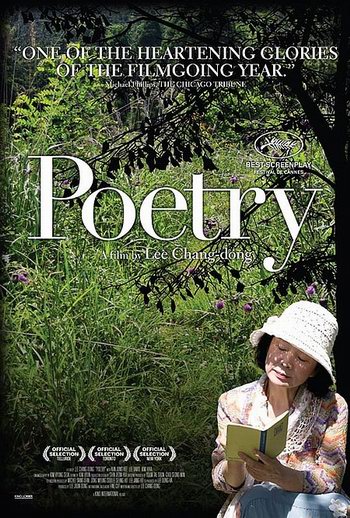Rotten Tomatoes heralded Poetry as "an absorbing, poignant drama because it offers no easy answers to its complex central conflict." and bequeathed its highest rating of 100%, so I knew I had to watch the film.
Poetry is a South Korean film written and directed by Chang-dong Lee in 2010 and stars Yun Junghee as its protagonist, an gracefully aging woman in the earliest stages of dementia, raising her grandson alone on a meager subsistence funded by social security and a part-time job as a maid and caregiver to an elderly disabled man.
The film ends just as gently and poignantly as it begins with the river at the edge of a small town on the outskirts of Seoul. I believe that the water must have been used symbolically to represent various aspects of this story, including the journey of life, renewal, cleansing and ritual purification. The natural landscape was as much a character in this film as were the people. As the title character, Mija, navigates this last phase of her life, upon learning that her inability to remember nouns only precedes the eventual loss of verbs, we watch her come to terms with a world she scarcely understands and struggles to find her voice within.
I don't want to give too much away as the film would not be fulfilling to the viewer if you knew some of the more unsavory details that are integral to understanding and appreciating the delicacy with which the storylines have been masterfully handled by the director. Suffice it to say, the film gave me a glimpse of the convergence of past-oriented traditional ideals and virtues clashing with modern expectations for future-oriented success.
Many of the characters engage in unspeakable acts that are glossed over in order to preserve prospects for future prosperity, all the while observing Confucian rituals of filial piety such as bowing before elders and practicing humility such as casting eyes downward when publicly praised for laudable accomplishments. For instance, I found it quite intriguing that even when it was clear that the nonsensical babbling of the elderly Mija was annoying some of the people she encountered, there was never a moment of disparaging eye rolls or hasty retreats that are more familiar to Western audiences. Perhaps it was that they recognized and expected to find kernels of wisdom in the musings and commentary of the esteemed elderly and when I considered it from that perspective I found myself feeling less annoyed and more compelled to hear what Mija had to say.
I think that is the true beauty of this film; if we can learn to listen more and talk less we may find enlightenment in the everyday truths even if they baffle or disgust us.
You are here
Film Review: Poetry
06/24/2012 06:15 AM
#1
Film Review: Poetry



I will have to watch this. Thank you for the review.